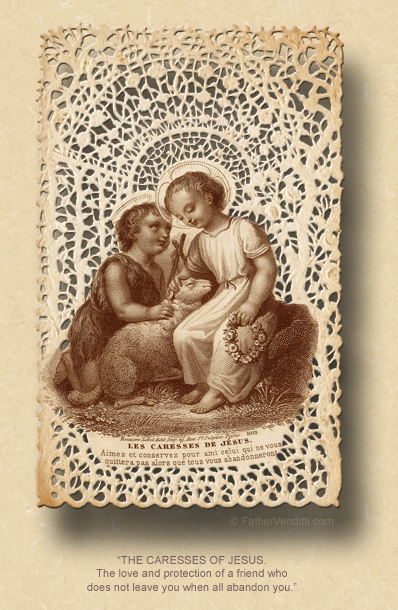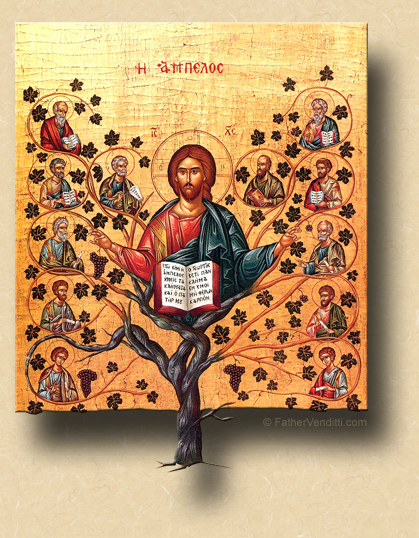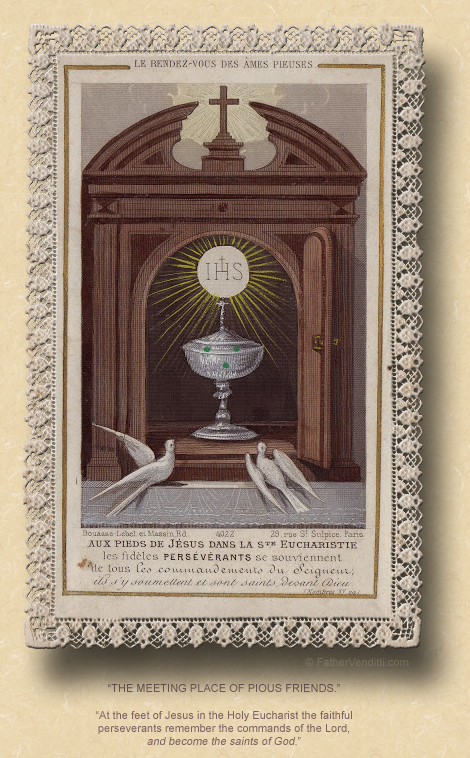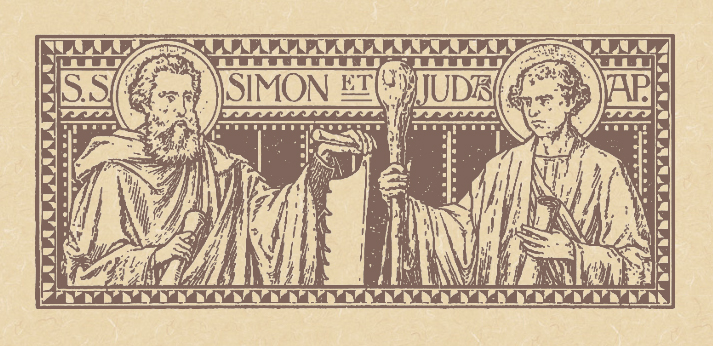The Faithful Soul Is Never Really Alone.
The Feast of Saints Simon & Jude, Apostles.
Lessons from the proper, according to the ordinary form of the Roman Rite:
• Ephesians 2: 19-22.
• Psalm 19: 2-5.
• Luke 6: 12-16.
The Second Class Feast of Saints Simon & Jude, Apostles.
Lessons from the proper, according to the extraordinary form of the Roman Rite:
• Ephesians 4: 7-13.
• Psalm 44: 17-18.
• John 15: 17-25.
FatherVenditti.com
|
 6:17 AM 10/28/2019 — Born in Cana, Simon the Zealot is so called because, prior to meeting our Lord,—perhaps even for a short time afterward—he belonged to a party known as the “Zealous for the Law,” which espoused a very strict interpretation of the Law of Moses. Jude, also known as Thaddeus, which means “the courageous one,” is remembered principally as the author of the short epistle which bears his name. It is commonly held that they preached the Gospel in Egypt, Mesopotamia and Persia—present day Iraq and Iran—where they both met their deaths as martyrs for the faith. 6:17 AM 10/28/2019 — Born in Cana, Simon the Zealot is so called because, prior to meeting our Lord,—perhaps even for a short time afterward—he belonged to a party known as the “Zealous for the Law,” which espoused a very strict interpretation of the Law of Moses. Jude, also known as Thaddeus, which means “the courageous one,” is remembered principally as the author of the short epistle which bears his name. It is commonly held that they preached the Gospel in Egypt, Mesopotamia and Persia—present day Iraq and Iran—where they both met their deaths as martyrs for the faith.
As we honor these two often-overlooked Apostles on their feast day, we can’t help but be moved by the warmth and consolation of the Scripture lessons read to us. Saint Paul reminds us, through the Ephesians, that we are not strangers or migrants—not outsiders looking in—but “fellow citizens" with all the saints in what he calls “the household of God,” a household built on the foundation of the Apostles, and held together by Christ. And he goes on to console us with the notion that this “household of God” is not only built and held together by Christ, but that each one of us is also “built up,” as it were, made strong and secure because we are all part of a whole; we all belong.
But it began with the Apostles; and, in our Gospel lesson, from the ever-intuitive Luke, we see our Blessed Lord singling out the twelve who would be his special friends, his confidants and, ultimately, the first bishops of his Church. As the Gospel would unfold, we will see our Lord growing ever closer to these men, traveling with them, praying with them, explaining to them the meanings of parables which remained hidden to everyone else. But we mustn’t succumb to the temptation to view the Twelve as some sort of clique. It wasn’t so much that Christ had decided to exclude everyone else following Him from this circle of close friends;  but, the mystery of the incarnation is that Jesus was fully a Man in every way, and, as such, He couldn’t relate to everyone on an equal basis; no man can. but, the mystery of the incarnation is that Jesus was fully a Man in every way, and, as such, He couldn’t relate to everyone on an equal basis; no man can.
And we know this, don’t we? You and I don’t relate to everyone we’ve ever met in the same way and to the same degree. Some friends are closer to us than others, people with whom we want to spend more time, with whom we are comfortable sharing intimate thoughts, dumping on them our sorrows and worries, and ever ready to do the same for them when need be. That’s not to say that Christ, as God, doesn’t regard everyone with the same Creator’s eyes, but as a Man He needed friends; every man does who has a heart.
Of course, if one wanted to be completely theological about it, one could say that our Lord had to single a few men out from His vast throng of followers because the Church He would establish would be a human institution and, as such, would need leaders to give it order and structure; and, as the first bishops of the Church, the Apostles certainly provided that. But that’s the mystery of the incarnation: as God He needed men to govern His Church, but as Man He needed friends.
And this is precisely why Saint Paul’s words to us through the Ephesians are so important, because our Lord’s need for a small group of friends doesn’t end with His ascension into Heaven, but is expanded—because now, with Christ as both God and Man reigning over us, we ourselves are gathered into that intimate group, with the ability to be just as close to our Lord as His first twelve friends were, to grow, as he says, “into a temple sacred in the Lord … into a dwelling place of God in the Spirit” (Eph. 2: 21-22 RM3).
This can be made real to us in any number of ways, but principally through the sacraments and through prayer. In the Blessed Eucharist, for example, we are as close to our Lord as any of the Apostles were, and every day if we so desire.  And while we may not always feel that close to our Lord, especially during those particularly lonely times through which we all pass, He is always there. It’s not always easy to remember, but the Christian who loves our Lord is never really alone. And while we may not always feel that close to our Lord, especially during those particularly lonely times through which we all pass, He is always there. It’s not always easy to remember, but the Christian who loves our Lord is never really alone.
Not only does the Blessed Eucharist unite us to our Divine Friend in an intimate way, it also unites us to one another. Each day that we’re privileged to be with our Blessed Lord at Holy Mass, we should remind ourselves that millions of our fellow Catholics, wherever they may be, are hearing the same Scripture lessons read to them, adoring the same Lord, receiving the same Grace of His own Body and Blood.
We may be very different from one another, but so were the Apostles whom our Lord first made His friends. If anything, the Gospels display very clearly the almost alarming differences between them. None of them were particularly bright, none were very proficient in any particular skill, and they came from many different walks of life: fishermen, tax collectors, the very religious, and the very irreligious until they met our Lord. A lot of them we don’t know much about because they had been formed by our Lord for the task of making Him known, not themselves. After our Lord’s ascension, they don’t talk about themselves, but about Him. In a manner of speaking, they would come to consider themselves the “envelope” of a letter from God. As different as they were from one another, they would come to share only one desire: to transmit the message they had received, passing it on to everyone they could find. That’s why we often don’t know much about them: it was the “letter” that needed to be sent and received by mankind, not the “envelope.” We don’t wait anxiously for the mailman because we want to see the mailman; we wait for him because we want what he comes to deliver.
That needs to be our desire, too: to be the envelope which carries the word of our Lord to all we meet. And we want to do it not because it will bring us glory or acclaim, but because we are His friends, members now of his most intimate circle. And by doing that, we can shed that veil of loneliness and isolation we sometimes feel with the knowledge that we are doing a favor for a friend.
Saint Jude, who shares today’s feast, questioning in his mind why our Lord had singled out twelve people to be his special friends, once asked our Lord, “…how comes it that thou wilt only reveal thyself to us, and not to the world? Jesus answered him, If a man has any love for me, he will be true to my word; and then he will win my Father’s love, and we will both come to him, and make our continual abode with him…” (John 14: 22-23 Knox). The Christian who faithfully carries the message of Christ is never alone.

|

